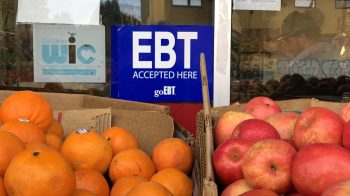
Now that pandemic SNAP benefits have ended, many scramble for food
Now that pandemic SNAP benefits have ended, many scramble for food

Jenna Thurston was 21 when she went on food assistance. She’d just had a baby and was struggling, and navigating the federal Supplemental Nutrition Assistance Program, and her new electronic benefits transfer card, was not easy.
“I was a new single mom, and it’s very frightening going on EBT,” Thurston said. “You have a lot of questions.”
Thurston lives in Wisconsin and there were local resources, but she ended up turning to Facebook for help. There, people exchange information, tips and support. One especially tough Easter, someone told Thurston that her SNAP benefits could help.
“I had my EBT card, and that bought Easter baskets for the children,” Thurston recalled. “They didn’t know back then that I was struggling, you know, and if it wasn’t for SNAP, they might not have had an Easter.”
A couple of years ago, Thurston started offering her own tips and advice about SNAP on a Facebook page and a TikTok account called EBT Mama.
During the pandemic, as unemployment spiked and millions of people received government food assistance for the first time, Thurston’s accounts blew up. Hundreds of thousands of people started turning to her for information and advice.
But a year ago in March, everything changed.
The emergency SNAP benefits Congress put in place during COVID expired, which meant that, basically overnight, millions of people had hundreds of dollars less for food each month.
Thurston saw the change in her DMs right away. Before then, most questions on her Facebook and TikTok had been about eligibility or red tape. Now? People just needed food.
“People were basically asking, ‘Do you know anywhere I can get free food?’” she said. “A lot of people were even asking about formula for their babies.”
Thurston’s own family was OK. They could manage with less, but a lot of the people reaching out to her were not OK. Thurston felt compelled to help as much as she could.
“At one point, I was like, ‘Please give me at least 24 hours to respond,’ you know? I would stay up until midnight helping people find food pantries in their area.”
Those food pantries, meanwhile, were getting slammed.
Jim Conwell is with the Greater Chicago Food Depository. It supplies food pantries, soup kitchens and shelters in the Chicago area, feeding nearly a million people every year.
Conwell said when SNAP was cut back, they quickly saw demand rise by about 26%.
“People would say their pay just wasn’t keeping up with grocery prices,” he said. Right now, more than 10,000 new people are coming to Chicago-area food pantries and soup kitchens every month.
“We’re seeing more and more people who, they have a job,” said Conwell. “They might have more than one job, but at the end of the month, there’s not enough left for food.”
Rolling back COVID-era SNAP benefits had profound effects across the country, said Diane Whitmore Schanzenbach, an economist at Northwestern University.
She pointed out the number of Americans saying they don’t have enough to eat increased from around 10% to more than 12% after SNAP benefits were rolled back. Poverty rates have also risen.
“This is millions of people,” said Schanzenbach. “It makes me sick to my stomach. When I saw the child poverty rates go up by so much, we know what that means.”
It means those children are less likely to graduate, less likely to hold a steady job and more likely to have health problems as adults.
Schanzenbach said this is why cutting entitlements is so hard. Even when you’re rolling back a pretty recent, temporary benefit, it often causes enormous pain.
At the same time, entitlement programs like SNAP, Social Security and Medicare are the U.S. government’s biggest expense by far. If Congress is going to tackle rising debt, cutting entitlements may well be part of that.
“We’re gonna have to do some things to get our budget balanced,” said Schanzenbach. “That is going to involve some hard choices, to be sure.”
She added that really high debt can destabilize an economy, and that’s not good for anyone.
Of course, right now, people need help. And without the extra SNAP benefits, they’re turning to food pantries, soup kitchens and Jenna Thurston’s Facebook page.
“I’ve sent some food items to people as well out of my pocket,” she said. “It’s, it’s just very hard to see people like that, you know?”
Thurston and her family went off SNAP last year. Work has been steady. But she said she gets messages every day from people who are desperate. She hopes Congress will see that desperation too and find some other place to cut.
There’s a lot happening in the world. Through it all, Marketplace is here for you.
You rely on Marketplace to break down the world’s events and tell you how it affects you in a fact-based, approachable way. We rely on your financial support to keep making that possible.
Your donation today powers the independent journalism that you rely on. For just $5/month, you can help sustain Marketplace so we can keep reporting on the things that matter to you.


















